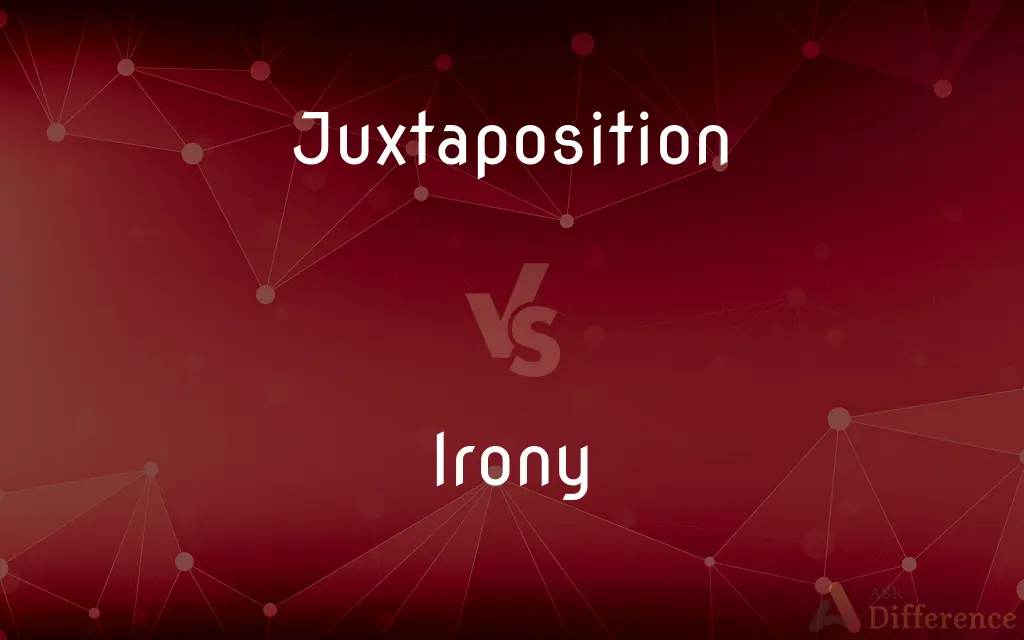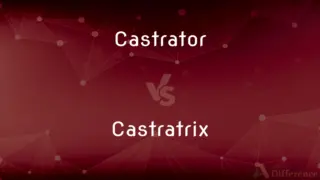Juxtaposition vs. Irony — What's the Difference?
By Maham Liaqat & Urooj Arif — Updated on May 9, 2024
Juxtaposition involves placing elements close together to highlight differences, while irony involves an outcome contrary to what is expected.

Difference Between Juxtaposition and Irony
Table of Contents
ADVERTISEMENT
Key Differences
Juxtaposition is a literary technique used to place two elements close together to highlight their differences or create an interesting contrast. Irony, on the other hand, refers to a situation where the outcome is significantly different from what was expected or intended.
In literature, juxtaposition might be used to compare two characters, settings, or themes directly, enhancing the reader's understanding of their relationship. Whereas irony might manifest in a story where a character’s efforts to avoid a fate directly lead to its fulfillment.
Visual artists use juxtaposition by placing disparate visual elements together to emphasize differences or create a new perspective. Conversely, irony in visual arts might be observed when an artwork’s apparent meaning contradicts its deeper message.
Juxtaposition requires only the presence of contrasting elements, which could be as simple as black and white colors in proximity. Irony, however, involves a layer of subtlety and often a twist, where the intended message is opposite to the literal interpretation.
In everyday speech, juxtaposition is often used for effect or emphasis, such as describing a very tall person standing next to a very short person. Irony might occur in speech when someone says, “What a beautiful day” during a storm, implying the opposite.
ADVERTISEMENT
Comparison Chart
Definition
Placement of two elements close to highlight contrasts
Expression where the outcome is opposite to expect
Usage in Literature
To create contrast or highlight differences
To create a twist or unexpected outcome
Visual Arts
Contrasting elements placed side by side
Use of imagery to imply the opposite message
Requirement for Understanding
Direct observation of the elements
Understanding of context and expectation
Common Usage
Often in descriptive contexts
Typically involves humor or sarcasm
Compare with Definitions
Juxtaposition
Used in art to bring together different forms, creating a striking effect.
The artist’s juxtaposition of bright and dark colors captures the mood swings inherent in human nature.
Irony
In historical context, when events turn out contrary to what was expected.
It is ironic that the leader who promoted peace was the one to declare war.
Juxtaposition
Placement of two contrasting elements close together for effect.
The juxtaposition of the modern skyscrapers and the ancient temple highlighted the city’s diversity.
Irony
A figure of speech where the intended meaning is opposite of the literal meaning.
Calling a slow-moving person “Speedy” is an example of irony.
Juxtaposition
A literary device to compare and contrast.
The poet’s juxtaposition of love and hate in his verses captures the complexity of relationships.
Irony
Dramatic irony in literature, where the audience knows more than the characters.
In a thriller, the audience knows who the villain is before the protagonist does.
Juxtaposition
In photography, a method to create striking compositions.
The photographer's juxtaposition of poverty against wealth provided a powerful social commentary.
Irony
Situational irony occurs when actions have an effect that is opposite from what was intended.
The fire station burned down - the irony could not be more poignant.
Juxtaposition
In cinema, the technique of placing disparate elements to enhance storytelling.
The film juxtaposes scenes of war and peace, emphasizing the fragility of life.
Irony
Verbal irony, often sarcastic or humorous.
Saying “Oh, great!” when something bad happens.
Juxtaposition
Juxtaposition is an act or instance of placing two elements close together or side by side. This is often done in order to compare/contrast the two, to show similarities or differences, etc.
Irony
Irony (from Ancient Greek εἰρωνεία eirōneía 'dissimulation, feigned ignorance'), in its broadest sense, is a rhetorical device, literary technique, or event in which what on the surface appears to be the case or to be expected differs radically from what is actually the case. Irony can be categorized into different types, including verbal irony, dramatic irony, and situational irony.
Juxtaposition
The act or an instance of juxtaposing or the state of being juxtaposed.
Irony
The use of words to express something different from and often opposite to their literal meaning.
Juxtaposition
The nearness of objects with little or no delimiter.
Irony
An expression or utterance marked by a deliberate contrast between apparent and intended meaning
"the embodiment of the waspish don, from his Oxbridge tweeds to the bone-dry ironies of his speech and prose" (Ron Rosenbaum).
Juxtaposition
(grammar) An absence of linking elements in a group of words that are listed together.
Example: mother father instead of mother and father
Irony
Incongruity between what might be expected and what actually occurs
"Hyde noted the irony of Ireland's copying the nation she most hated" (Richard Kain).
Juxtaposition
(mathematics) An absence of operators in an expression.
Using juxtaposition for multiplication saves space when writing longer expressions. collapses to .
Irony
An occurrence, result, or circumstance notable for such incongruity
The ironies of fate. See Usage Note at ironic.
Juxtaposition
The extra emphasis given to a comparison when the contrasted objects are close together.
There was a poignant juxtaposition between the boys laughing in the street and the girl crying on the balcony above.
Irony
Dramatic irony.
Juxtaposition
(arts) Two or more contrasting sounds, colours, styles etc. placed together for stylistic effect.
The juxtaposition of the bright yellows on the dark background made the painting appear three dimensional.
Irony
Socratic irony.
Juxtaposition
(rhetoric) The close placement of two ideas to imply a link that may not exist.
Example: In 1965 the government was elected; in 1965 the economy took a dive.
Irony
(rhetoric) The quality of a statement that, when taken in context, may actually mean something different from, or the opposite of, what is written literally; the use of words expressing something other than their literal intention, often in a humorous context.
Juxtaposition
To place in juxtaposition.
Irony
(countable) An ironic statement.
Juxtaposition
A placing or being placed in nearness or contiguity, or side by side; as, a juxtaposition of words.
Parts that are united by a a mere juxtaposition.
Juxtaposition is a very unsafe criterion of continuity.
Irony
Dramatic irony: a theatrical effect in which the meaning of a situation, or some incongruity in the plot, is understood by the audience, but not by the characters in the play.
Juxtaposition
The act of positioning close together (or side by side);
It is the result of the juxtaposition of contrasting colors
Irony
Socratic irony: ignorance feigned for the purpose of confounding or provoking an antagonist.
Juxtaposition
A side-by-side position
Irony
(informal){{cite-journal
Irony
Of or pertaining to the metal iron.
The food had an irony taste to it.
Irony
Made or consisting of iron; partaking of iron; iron; as, irony chains; irony particles; - In this sense iron is the more common term.
Irony
Resembling iron in taste, hardness, or other physical property.
Irony
Dissimulation; ignorance feigned for the purpose of confounding or provoking an antagonist.
Irony
A sort of humor, ridicule, or light sarcasm, which adopts a mode of speech the meaning of which is contrary to the literal sense of the words.
Irony
Witty language used to convey insults or scorn;
He used sarcasm to upset his opponent
Irony is wasted on the stupid
Satire is a sort of glass, wherein beholders do generally discover everybody's face but their own
Irony
Incongruity between what might be expected and what actually occurs;
The irony of Ireland's copying the nation she most hated
Irony
A trope that involves incongruity between what is expected and what occurs
Common Curiosities
What is the purpose of juxtaposition?
To highlight differences or create striking contrasts.
Can juxtaposition be unintentional?
Yes, it can occur naturally without the creator’s intent.
What are examples of juxtaposition in daily life?
Old and new buildings side by side.
What are examples of irony in daily life?
A traffic jam when you’re already late.
How does juxtaposition enhance storytelling?
It visually or contextually highlights contrasts.
How do filmmakers use irony?
By creating situations where the outcome defies expectations.
How does irony contribute to humor?
It creates a twist that can lead to unexpected laughter.
Is irony always obvious?
No, sometimes it requires context to be understood.
Can juxtaposition create irony?
Yes, when contrasting elements together lead to an ironic situation.
How do filmmakers use juxtaposition?
By contrasting images to enhance the narrative.
What role does juxtaposition play in poetry?
It sharpens contrasts between themes or descriptions.
What role does irony play in poetry?
It adds layers of meaning, often enhancing the thematic complexity.
Can juxtaposition be found in music?
Yes, through contrasting musical elements or lyrics.
How does irony enhance storytelling?
It adds depth and twists, making stories more engaging.
Is irony always intended to be humorous?
No, it can also be tragic or poignant.
Share Your Discovery

Previous Comparison
Castrator vs. Castratrix
Next Comparison
Spencer vs. SpenserAuthor Spotlight
Written by
Maham LiaqatCo-written by
Urooj ArifUrooj is a skilled content writer at Ask Difference, known for her exceptional ability to simplify complex topics into engaging and informative content. With a passion for research and a flair for clear, concise writing, she consistently delivers articles that resonate with our diverse audience.












































